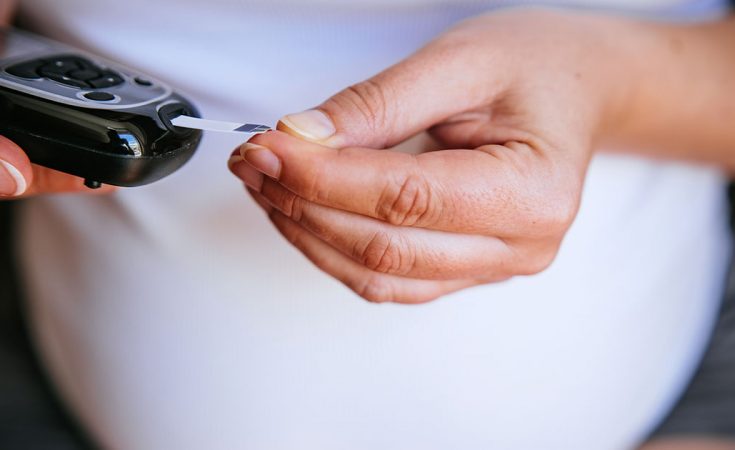
I had hypermesis gravidarum with all three of my sons: I couldn’t keep food down. I couldn’t keep anything down. With my youngest, it became so bad I was admitted to the hospital overnight for fluids. But still, somehow, at twelve weeks, I was gaining weight. I have a very strong family history of diabetes: it’s all over my paternal side of the family. So I glanced at my husband. “I need to get seen,” I said. “I think I have gestational diabetes.”
Almost no one is diagnosed that early — gestational diabetes is diagnosed via a fasting blood sugar test, which usually happens between 24 and 28 weeks. You’re at higher risk for it if you’re overweight (I was, by a little), have had gestational diabetes in the past (I hadn’t), have given birth to a baby weighing more than nine pounds (nope), or have a strong family history of diabetes (blinking red warning sign for me).
Because of my hyperemesis and weight gain, it was easy to see that my blood sugar had gone haywire. Gestational diabetes sucked. Gestational diabetes was hard. It made pregnancy difficult, and my labor was different; I had to be induced. My baby was bigger. They worried about his blood sugar.
And yeah, gestational diabetes comes with a lot of… paraphernalia. But I promise: you get used to it.
Gestational Diabetes Calls For Serious Dietary Changes
You need to eat small meals often. Those small meals have to be well-balanced with protein and high-carb foods in correct proportions. Then you need to check your blood sugar. This is a tedious, tiresome, pain in the butt. You get used to counting the carbs and protein for every single thing, and weighing the pros/cons of eating whatever food you are craving, but it’s not fun.
You will need: breakfast, a snack, lunch, a snack, dinner, and a snack. I found that only eating ice cream as my nighttime snack kept my sugar from crashing overnight and spiking in the morning. I’d had this tip passed to me from other moms who’d dealt with gestational diabetes. Obviously, check with your doctor first. But if you can’t get that morning sugar under control, it might be worth a try. And no, you can’t go hog wild on the ice cream. Just a little bit will work. But it’s still ice cream.
Then Comes The Blood Sugar Monitoring
Do you have a blood squick or a needle-phobia?
Now you don’t.
No, really, you don’t anymore.
Many monitors will check your sugar levels without that lovely little finger prick and test strip (no, it doesn’t hurt). Or, at least, you don’t actually see that blood drop. However, they’re expensive, and lots of insurance plans — including mine — didn’t cover one.
If you’re lucky, you won’t need to go on insulin — you’ll be able to control your GD with diet alone. But about 30% of people with gestational diabetes require insulin to control their blood sugar levels. This is not as bad as it sounds. My doctor told me that sometimes women break down in her office when they’re told they need insulin. You don’t need to break down. Don’t get me wrong: it sucks. But, it’s going to to be fine.
My insurance wouldn’t even pay for an insulin pen. Those easily measure the amount of insulin your doctor prescribes, and painlessly inject it without you seeing the needle. My insurance denied that, so I had to go old school. Old school gestational diabetes means that your pharmacist hands you a vial of insulin, and you buy a pack of needles. Carrying these needles everywhere may make you feel really self-conscious, because who else carries freaking needles in their purse?
I had to draw a measured dose of insulin from a vial and inject it into my thigh, three times a day. Then I had to discard the needle into a “medical waste” container labeled “SHARPS,” which I could only dispose of at proper locations. The needles didn’t hurt. I sort of felt like Stacey McGill from The Baby-Sitter’s Club, though I didn’t have to practice stabbing oranges. But it sucked. I had to tote insulin and needles in my purse if I went anywhere. Going out to lunch? Time to stab myself in the bathroom!
I got lucky. I had a pretty severe case — stabby-stabby thrice daily, then an induction, which resulted in 8lb, 11oz baby (he outweighed his two older siblings by an entire pound). He was big, but I didn’t need a C-section. I was induced, but my blood sugar didn’t drop during labor. After he was born, my son’s blood sugar didn’t drop either (a possible complication), and he didn’t need any kind of interventions.
Gestational Diabetes Sucks
Gestational diabetes sucks. There’s no way around it. The diet is annoying. You may end up needing insulin, or at least the drug metformin, which helps control insulin resistance. But the vast majority of women with gestational diabetes go on to have healthy babies. You probably feel like crying a lot of the time, mostly because you’re pregnant and you want to cry about everything and injecting something into your thigh three times a day is something to cry about. I sympathize. I cried too.
Mostly, I was angry: why me? Why is my body doing this? Why can’t I have a normal pregnancy?
It’s okay to feel all those things. And it’s okay to grieve that so-called “normal” pregnancy. Give yourself space for that as you prick your finger. Don’t let anyone give you that “well, at least you are having a baby!,” crap. Yeah, you are, and that’s hashtag blessed, but you get to have your own feelings about your own body. Don’t let those people make you feel guilty for your (wholly justified) feelings of grief, sadness, and anger.
Those feelings may go away when you have your baby. But they may not, and that’s okay too. Give yourself space to feel whatever you need to. Just remember through all of it that you are stronger than you know. You are powerful. You got this, even when it feels like there ain’t no way in hell you do.


































